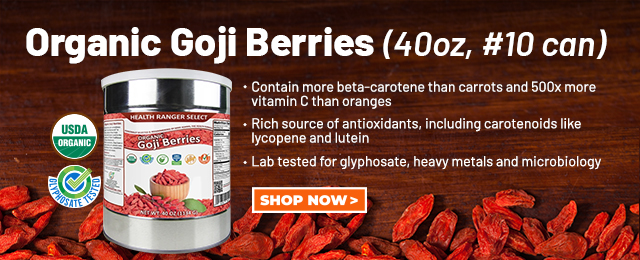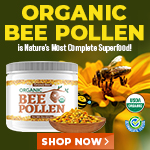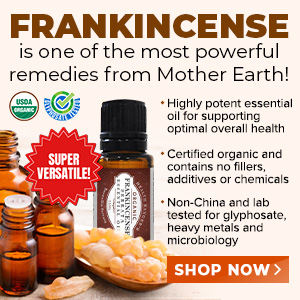
Composting: Give Back to Mother Earth
Tuesday, July 21, 2009 by: Kim Evans
Tags: composting, health news, Natural News
- Criminal referral requests filed against Fauci and top COVID officials in seven states
- Aluminum, essential to vaccine science, also causes serious health conditions, including chronic fatigue, neurodegenerative diseases, macrophagic myofasciitis
- DOGE unveils $400M unemployment fraud scandal: Toddlers, futuristic birthdates fuel outcry
- Oats: A nutritional powerhouse for health and wellness
- Gardening tips: 15 Simple tricks to double your garden’s yield this season
- TAKE IT DOWN Act advances in Congress amid free speech concerns
- A turning point in American economic history: “The Origins of the Federal Reserve” by Murray N. Rothbard
- Nature’s arsenal: How plant compounds power military survival and healthcare in crisis
- Kawasaki unveils rideable ROBOT HORSE powered by hydrogen
- Survival 101: Dangerous places to avoid when disaster strikes
- Amazon's Kuiper satellite launch delay highlights uphill battle against Musk's Starlink
- DOJ and ATF kill Biden’s “Zero Tolerance” firearms dealer policy
- U.S.-funded "anti-misinformation" groups persist, raising concerns over censorship and bias
- Tesla halts U.S.-made Model S and X orders in China amid escalating trade war
- Trump to impose major tariffs on foreign-made pharmaceuticals
- “Prepare Tribe: Prepare, Protect, Provide” on BrightU: Protecting heirloom crops from corporate extinction
- Barley: A nutrient-dense ancient grain with modern benefits
- “Prepare Tribe: Prepare, Protect, Provide” on BrightU: How to build a disaster-proof shelter in the middle of nowhere
- Tulsi Gabbard leads charge against the Biden regime’s global censorship of the 'Disinformation Dozen'
- Fauci is back in the limelight, and he’s busy promoting a future COVID or FLU pandemic
- Aerosolized bioweapons? Strange “diploid biomasses” falling out of the sky in Florida captured under the microscope
- Analysis: The coming economic collapse, a mass uprising and Trump's three secret weapons to halt the growing revolt
- Widespread social and economic unrest: Steve Quayle issues urgent financial warning of imminent asset collapse in new interview with Mike Adams
- Kiss Your Genetic Privacy Good-Bye! 23andMe Gets Green Light to Sell Your Intimate Genetic Details to Anyone They Want
- Tulsi Gabbard takes aim at censorship: Justice for the ‘Disinformation Dozen’
- Mike Adams releases country western hit single: Goin’ Back in Time is Comin’ Home
- U.S. lawmakers investigate Meta over alleged China collaboration
- CLOT SHOT PLANDEMIC UNFOLDING: Fibrous, rubbery clots caused by covid injections have prion-like seeding activity
- Chemtrails unveiled: How the CIA and Big Business are manipulating the weather for profit
- How Israeli military-connected corporations are secretly controlling your online privacy
- European Court of Justice: Healthcare professionals who promoted or administered COVID-19 vaccines are CRIMINALLY LIABLE for any harm caused
- DEATH by VACCINE or face PRISON time: Canadian Freedom Convoy leaders CONVICTED for protesting forced vaccination during the Covid Plandemic
- Defunding DEADLY mRNA jabs: Government funding for mRNA technology being scrutinized and sidelined until proven "safe and effective" for real
- Federal employees whine over DOGE's new directive requiring them to do a 5-point summary of weekly accomplishments
- U.S. approves new Russian ambassador as diplomatic thaw continues
- Curcumin’s ancient healing power supercharges muscle recovery, and its effects are compounded with anti-inflammatory foods and supplements
- Newly released JFK files reveal Pentagon's role in creating Lyme disease and covid in the same lab
- Analysis: The coming economic collapse, a mass uprising and Trump's three secret weapons to halt the growing revolt
- Mike Adams releases country western hit single: Goin’ Back in Time is Comin’ Home
- Aerosolized bioweapons? Strange “diploid biomasses” falling out of the sky in Florida captured under the microscope
- Kiss Your Genetic Privacy Good-Bye! 23andMe Gets Green Light to Sell Your Intimate Genetic Details to Anyone They Want
- Dr. Mike Yeadon releases 15-minute testimony - WATCH - about genocidal intent of COVID “vaccines”
- Trump reverses course on Gaza plan, says “nobody is expelling Palestinians”
- MEDICAL BOMBSHELL: FDA admits Covid mRNA 'Vaccines' CAUSE CANCER
- European Court of Justice: Healthcare professionals who promoted or administered COVID-19 vaccines are CRIMINALLY LIABLE for any harm caused
- The Health Ranger releases “Vaccine Zombie” song and music video, using AI-animated zombies for the music video
- 5 Simple steps to boost your brainpower: How to strengthen executive function in a distracted world
- A lack of integrity in Academia: Harvard professor found GUILTY of fraudulent research to promote CRT theory
- Federal employees whine over DOGE's new directive requiring them to do a 5-point summary of weekly accomplishments
- EPA advisor admits the agency is funneling billions to climate groups ahead of Trump’s return to White House
- California's social media censorship law struck down: A victory for free speech or a threat to online safety?
- Space war brewing? Russia threatens to destroy Starlink satellites
- Survival 101: Effective EMF blocking techniques
- Rep. Nancy Mace introduces bill to ban biological males from female facilities on federal property
- Red Cross issues warning to stop blood plasma donations from vaccinated people
- Scientists confirm: GENIUS brain function can be spontaneously unleashed in humans without any apparent cause
- EPA advisor admits the agency is funneling billions to climate groups ahead of Trump’s return to White House
- HYSSOP: What research reveals about the health benefits of this ancient holy herb
- Two containers with completed ballots fall out of truck in Florida
- Newly released JFK files reveal Pentagon's role in creating Lyme disease and covid in the same lab
- Global leaders unite to clamp down on “misinformation” with UN-backed Cascais Declaration
- BREAKING: 2025 NDAA authorizes mandatory military draft of WOMEN across America… as Pentagon pursues global NUCLEAR war with both Russia and China at the same time
- Michael Yon warns of a ZIONIST TAKEOVER in Trump’s second administration
- Ozempic and Wegovy weight loss drugs are injectable LIZARD VENOM PEPTIDES that may unleash a devastating wave of organ failure… side effects align with symptoms of SNAKE BITES
- The Health Ranger releases “Vaccine Zombie” song and music video, using AI-animated zombies for the music video
- Mike Adams releases country western hit single: Goin’ Back in Time is Comin’ Home
- BOMBSHELL: DNA testing kits are a SCAM to develop ethnic-specific bioweapons
- Israeli soldiers accused of even more torture and abuse in the West Bank
- These 13 countries just signed an agreement to engineer a global FAMINE by destroying food supply
- NASA admits that climate change occurs because of changes in Earth’s solar orbit, and NOT because of SUVs and fossil fuels
- Fully vaccinated about to see “tsunami” of illness and death, warns virologist
- RFK Jr. clears key hurdle: Sen. Susan Collins backs controversial HHS nominee, signaling a new era for health policy
In light of the obvious problems, and the reluctance for real change from a top down approach, a lot of people have started wondering what they, individually, can do about these problems that seem larger than any one of us. Fortunately, there are a couple of solutions that, in their own ways, address many of the problems above.
One of those answers is composting, or turning your kitchen and yard waste into nutrient-rich soil. Composting is a fun project, and it`s one of the most environmentally friendly things you can do.
Composting works on environmental problems on a number of levels.
The truth is: if you eat a fresh fruit and vegetable oriented diet, recycle all you can, and compost all you can, there really isn`t much left to send to the landfill. If you`re already recycling, and simply start composting, many families can reduce the amount of trash leaving the house by half or more.
By composting instead of sending the waste to the landfill, you`re actively reducing the amounts of greenhouse gasses created in the landfill, and the compost itself pulls the greenhouse gas carbon dioxide out of the air.
It`s estimated that a fifth acre garden with compost tilled into the top 8 inches of soil can remove 19,000 pounds of carbon from the atmosphere. That offsets about one and a half years of an average American`s carbon emissions.
When your compost has finished, you can use it to fertilize your yard - and end the use of store bought or chemical fertilizers. This makes your yard (and the air around your home) safer for you and your family, while feeding optimal nutrition to the Earth and creating an optimal growing environment. It`s said that well composted soil helps with every growing problem, including pests and drainage.
Once your soil has been brought to life with your nutrient-dense compost, you might be encouraged to plant a few fruit trees, vegetables, or herb bushes to regularly provide fresh pesticide-free foods for your family in a sustainable manner.
While composting isn`t the whole answer, it`s a great start in the right direction. Another big improvement is to simply avoid plastics whenever possible. Plastics, particularly plastic bags, aren`t easily recyclable. In fact, each grocery store plastic bag costs only 1 cent to make, but far more to recycle. That`s why so many of them are floating up near the North Pole.
How to Compost
For the uninitiated, composting might seem overwhelming, but once you know the basics, it`s simple. Here`s a quick run down on the basics of composting.
One of the most important things is that you need about 1/3 greens to 2/3 browns for it to be successful. But, what does this mean? Generally speaking, greens are from your kitchen and anything green from your yard. Brown is anything brown from your yard (including dried grass and leaves), and can also include cardboard, paper towels, and newspaper. Waste from a cat or dog should not be added to the pile.
If you don`t have enough browns your nitrogen balance will be off and you`ll know this because your compost will start to smell, which is undesirable. The green brown ratio doesn`t need to be exact, but keep in mind that you`ll need more browns than greens. And if it starts to smell, just add more browns, mix it up, and it should become fine.
All fruit and vegetable waste is fair game for composting, but don`t use processed foods, dairy, egg, or meat remains; they`ll rot (in a bad way) or attract animals. Egg shells are fine. They add calcium, but if you use them, rinse and crush them; they take a while to decompose. If you want to speed your results, cut up your kitchen remains before adding them to your compost pile.
You`ll need an area of your yard for composting or a compost bin. You can buy a professional bin, or make one with a container you already have. Either way, the size should be in line with the amount you`ll be composting. It should be kept in a warm place that ideally is a little away from your house.
Once your bin or composting area is all set up, just toss everything in and mix it up. Then toss in some dirt to give it the microbes needed to start the decomposition process. Then add a layer of browns to the top, which will trap the heat inside and discourage pests.
Your compost should be a little damp, but not soaked which can lead to fungal growth. Your compost should also have access to air, as opposed to being sealed. You can and should "turn" or stir your compost somewhat regularly, at least every week or two. Turning your compost will give it air and speed the process along. After turning it or adding more greens, add a light layer of browns to the top.
The length of time it`ll take to decompose depends on a couple of factors, including the temperature of the compost, the size of the pieces, how often you turn it, the size of the compost, and more. Depending on these factors, it can take anywhere from a month to several months to completely decompose.
Some people keep two bins going simultaneously. One can be added to on a continual basis while the other is left to compost without new materials being added. When the fully composted material is finished and used, a new batch is started, and the pile that was previously the "add to" pile becomes the pile that just sits to compost.
Keep in mind, there are many different approaches to composting out there. The above is the down and dirty for the beginning composter, and should be enough to get you started.
More:
http://www.telegraph.co.uk/earth/environment...
http://www.epa.gov/oppbead1/pestsales/01pest...
http://www.motherearthnews.com/Organic-Garde...
http://www.foodshare.net/garden13.htm
About the author
Kim Evans is a natural health writer and author of Cleaning Up! The Ultimate Body Cleanse. Cleaning Up! offers deep cleansing and using methods in this book, people have gotten rid of dozens of different types of health problems, as well as just losing excess weight, thinking more clearly, and feeling better.Kim's next book chronicles events in her life that happen to match patterns in the Bible. She's also found three places in the Bible that tell us its about these patterns and even asking you to match them.
Here's a little from the upcoming book...
In Isaiah 22:20, it says, "And it must occur in that day that I will call my servant, namely Eliakim." But, because these prophecies are cryptic and they aren't meant to be understood until they are understood, it's only the last three letters.
A few lines later, it says, "From the land of Kittim it has been revealed to them."
Here, you just take out any three middle letters, and again, it's the name of the person bringing you this message, or the sacred secret of the prophecy. Actually, if you take those two passages, Kim is about the only name you can get from both of them.
In Numbers 1:1 – 1:18, it's talking about "the family" and mentions Pagiel. It also twice mentions February 1st, (Kim's birthday) and then says that the youngest is 20 years old. Kim's little sister Paige is currently 20 years old.
In Chronicles 1 11:20 it mentions the brother of Joab and then in the same sentence uses the word brandishing. Kim's middle name is Jo and her older sister's name is Brandi. There are other patterns to her sisters too but these sort of mention them by name.
Of course, it helps if you know that there is a magical spiritual reality available that comes deep cleansing and often major dietary upgrades. It's also why Jesus was teaching the same thing, if you find his teachings in the Essene Gospel of Peace. In this text, he even says things like, "You'll never see the father unless you clean your colon." But, this is paraphrased...
In the Bible Jesus says things more like, happy are those who wash their robes, as they can enter the tree of life. The tree of life is elsewhere explained as God's paradise. He also said, first clean the inside of the cup and then the outside will also be clean.
Kim's book Cleaning Up! is here http://www.cleaningupcleanse.com. You can also preorder The Sacred Prophecies Have Been Fulfilled
here. It shouldn't be long.
Composting at FETCH.news
Get independent news alerts on natural cures, food lab tests, cannabis medicine, science, robotics, drones, privacy and more.
Take Action: Support Natural News by linking to this article from your website
Permalink to this article:
Embed article link: (copy HTML code below):
Reprinting this article:
Non-commercial use OK, cite NaturalNews.com with clickable link.
Follow Natural News on Facebook, Twitter, Google Plus, and Pinterest
Science News & Studies
Medicine News and Information
Food News & Studies
Health News & Studies
Herbs News & Information
Pollution News & Studies
Cancer News & Studies
Climate News & Studies
Survival News & Information
Gear News & Information
News covering technology, stocks, hackers, and more



"Big Tech and mainstream media are constantly trying to silence the independent voices that dare to bring you the truth about toxic food ingredients, dangerous medications and the failed, fraudulent science of the profit-driven medical establishment.
Email is one of the best ways to make sure you stay informed, without the censorship of the tech giants (Google, Apple, Facebook, Twitter, YouTube, etc.). Stay informed and you'll even likely learn information that may help save your own life."
–The Health Ranger, Mike Adams












































